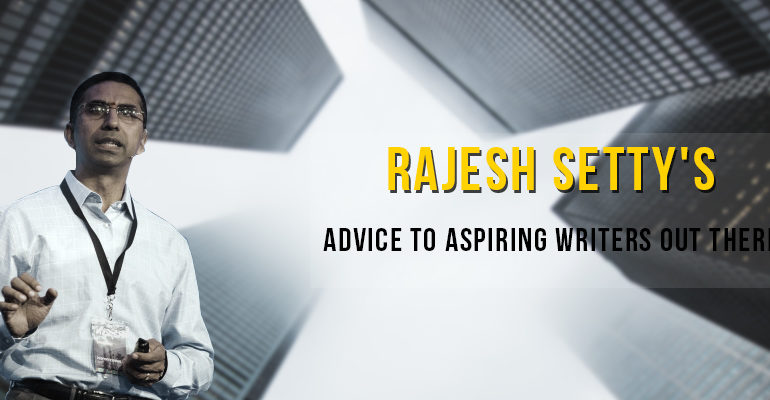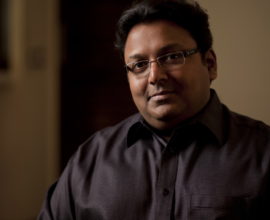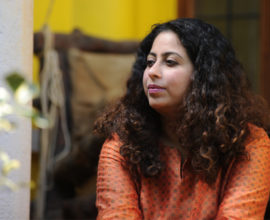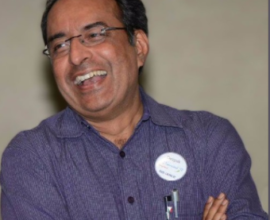Rajesh Setty, Author of 18 Books, Offers Advice for First Time Authors
Rajesh Setty has authored 18 books. And that’s not even his profession. He managed to do this in spite of wearing multiple hats. He is a Silicon Valley serial entrepreneur, an investor and mentor to many startups. He is a sought after speaker and consciously focuses on sharing his thoughts through writing, be it blogs, columns or books. Listen to the episode to learn about this writing journey and the valuable advice that he has for first time authors. Here is a great podcast for writers to begin their publishing journey.
Transcribed Text from the Podcast:
[Intro Music]
Kiruba: Hello and welcome to another edition of first book a podcast dedicated for first time authors. I am Kiruba Shankar and I use this podcast to speak with established and experienced authors to glean information on their writing best practices and specially to learn how they successfully crack their first book. This podcast is supported by Notion Press, who share our vision of helping first-time authors. They help authors with all supporting services like editing, proofreading, formatting, designing, printing, distribution, promotion; well, you know the works so you can focus on your writing. In this episode, we speak with a man who has authored eighteen books and for whom I have a lot of respect for. Rajesh Setty is a Silicon Valley serial entrepreneur, an investor, a mentor to many startups. He is the sought after speaker and consciously focuses on sharing his thoughts through writing via blogs, columns, or books. Let’s jump straight into the conversation with Rajesh Setty.
So, Rajesh, thank you so much for coming on this show; it’s such a pleasure.
Rajesh: Same here, Kiruba; I am so glad that we are talking on a topic that is so close to my heart.
Kiruba: It’s close to your heart because you have authored so many books and also because you hold a very interesting record. You published your first book when you were very, very young. So, talk us through that, Rajesh.
Rajesh: Yes, that was not basically planned or anything, right? So, I was very interested in reading, Kiruba. When I was about four, I started reading books. By the time I was nine, nine-and-a-half, I had read close to 700 books. If you ask my mom, she will tell most of them were useless books and she will be right about it because anything related to fantasies, stories attracted me a lot and I used to play a game with myself thinking that because I had read so many books, I would predict how this story would evolve by the end of it if it was a horror-mystery, I would think, I knew who would be the killer. If it was a treasure hunt, I knew where the treasure would be. At least I thought I know, and then most of the time I used to be really wrong and that would upset me because I wanted to be so right and then at about ten, I thought the only way I can be right, hundred percent right, is create my own novel. So, that way nobody can question who is the killer where is the treasure, how do they get it, or how does someone get framed. Whatever it is that I wanted to do, I can do whatever I want with my character. It took me about 8 months to write a 200-page book. I used to use sheets of paper from my dad’s desk and sometimes my parents thought I was a little bit off the center but they just allowed me to be who I was because I was very good in my studies.
Kiruba: What age were you?
Rajesh: I was about ten. Hmm. So, I was good in my studies so they thought this madness will end and one day it will all happen and as long as he was good in studies, you and I are coming from Indian parents and so we know that the emphasis on getting good marks is really, really high and that comes beyond any other creative pursuits kids have, at least at that point in life. So, I finished my book in about eight months and then the real adventure began. I thought writing a book is so hard, but publishing should be so easy because what does it take? Somebody has to go to a printing press, they just assemble all the things that I wrote, and woila that will be there in the bookstores and I will be a famous person. So, that’s the fantasy land. Little did I know that I would be rejected 160 times for over 3 and half years. I say that I have a bachelor of engineering in electronics and a PhD on how to get rejected. And this is at a very impressionable young age, right? Yeah, if god wanted me to have that experience very early; here, people say fail hard often, fail cheap, all those things. For me before I realised all my dreams in entrepreneurship, I learnt the art of failing very quickly; and over a long period of time and very frequently. So, in 1983, when I was 13, I got my first book published. The good news is I learnt a lot in my failures, I made a lot of friends, and I got a lot of help along the way. So, the journey itself shaped the way I’ll live my life, Kiruba. More than publishing and the things I do, I know that I don’t know everything, so that way, I am very open to learning new things.
Kiruba: So, this was right now I’m fast forwarding it. How many books are under your kitty now, Rajesh? Rajesh: I’ve written probably about sixteen books, Kiruba and I have about, and you know that I do ongoing research on one or the other topic. So, I have ten more books that I have written, unpublished. That is right. I keep following you on Facebook and I know that there are lots of interesting projects you are working on.
Kiruba: So, in all your experience of authoring sixteen books, you having ten books in the kitty, what are some of the tips that have helped you write your books fast?
Rajesh: Yeah, one of the things that will look intuitive is the psychological term called Zeigarnik effect. It is started by a Russian scientist called Bluma Zeigarnik. She found that if the mind finds a gap, it will try to fill it. So, that’s the essence of the Zeigarnik effect. It means, many people say when you start writing, you have to complete it at one go. I am of the opinion that I start something and I leave it half baked. I will leave it, get the power of the subconscious power to work on it, help me complete the remaining article. That has been my mantra for more than a decade that if I want to write a blog post, I will write the first paragraph and I will leave it there. Let it simmer, let it gain some traction, let the mind wander around it. And then when I come back to completing the blog post, I will complete it in a breathtaking speed. See, if there was one counterintuitive one, that will be the one. Harness the power of the Zeigarnik effect.
Kiruba: Brilliant one! This is almost similar to the one Jimmy Wales, founder of the Wikipedia said, Rajesh. One of the reasons why Wikipedia grew really big was because someone somewhere has written just one sentence for a topic, and that was the motivation for various other people to come in and head on to it. So, perfect.
Rajesh: Yeah, that is so true. Many times people think that if something is half done, then they’ll lose interest. They’re not motivated enough, they’re not committed enough. They are not letting the mind do the work. They are trying to do everything by themselves. So, applying Zeigarnik effect for writing is really, really good and you want me to share one more! I use the lean startup methodology applied to writing. You can call it lean writing. So, the lean writing process is very simple. The earliest time I have an idea I have about anything, I start sharing it because I am a teacher at heart. I tell, This is the model I am working on. What do you think? It’ll be so early that people will start asking questions about it. Now, I am doing research on how companies gain early traction. What do they do? And I have built a framework and it will definitely become a course or a book one day. But I have taught, given this as a workshop already four times, as I am developing the framework. Why because, at the end of the workshop or the talk, people ask a lot of questions. I record all of them very diligently because if people have questions and they are committed to ask them, there is a good chance that hundred other people have the same question and that will help me complete the framework, get material for the book, for the course. So, just get it out to the world as fast as possible so that the world will help you, collaborate with you to complete your book.
Kiruba: Brilliant one, Rajesh. Brilliant one!
Kiruba: Also, I get another lesson out of that it. It is that to try and make this work in multiple ways. So, one is it is the book you were planning and you have also converted that into a workshop. You could convert that into a series of blog posts. You could have a podcast around that subject and that is also a way of making your idea into different manifestations.
Rajesh: That is so true, Kiruba. Jim Rohn’s famous quote is one of my favorite mantras. Jim Rohn has passed away. He is no more but he is a brilliant teacher. He used to say, Every disciplined effort has multiple rewards. [Coughs] When I see that, I always think, when there is an idea you want to bring it to life, there are many forms of expressing and book is only one form and it need not be limited to a book like you said a blog post, a podcast, a workshop. Maybe you can say, create a series of t-shirts if it is for a particular target audience. You can create a bunch of postcards. You can create laptop covers. You can create playing cards with insights from the book. You can create an auto-responder series that is it automatically sends out one piece of insight as an email course. I can think of a dozen other ways and then it can all come together as a book or if you have so much on creating t-shirts, you can stay there.
Kiruba: Brilliant! You also made a very interesting effort on writing and finishing a book within 24 hours. The entire process so, talk us through that entire experience.
Rajesh: Yeah. The person to be blamed is my mentor Ofer Brayar and then during Christmas break, nothing happens in the United States. We were thinking we should do a project. And one project, he was asking me, Raj, what do you enjoy most? What comes naturally for you? I said, Writing would be one. Although it is a hobby I take it very, very seriously. He said, it true that everybody else will also like this, all the CEO friends! I said, No. 9 out of 10 CEO friends may hate writing. Very good in speaking, participating in Q&A, they don’t like to write. So, is it something that you can teach someone? I said, I don’t know if I can teach but I can share all the insights that Ive got because I have been writing since I was 10 years old and I have a blog that has about 1945 blog posts, some 16 books. All the things that I have written, all the knowledge and insights, I can share it. So he asked me, How long does it take to write a book? I said, hours it can take. About two weeks, which was the time we had during the Chirstmas break. So, he asked me, Why don’t you do it within 40 hours? I said..I just told him 80 hours and he is asking me half of it. 80 hours is already an aggressive target. So, I thought, let me cheat a little bit. I told, Yeah, I will do it. In my mind, I was thinking let me finish it in 80 hours. How will far know that I did it in 80 hours? I can just tell that it is 40 hours. So, the evil mind was scheming. Mentors are always more insightful than us, right? So, he said, Raj, you should do it in 40 hours. But what if people doubt that you did it in 40 hours? I said, Why would they do that? There is no intention for me to cheat and I’m smiling inside thinking I have all the intention to cheat. So, he said, I want you to do one thing. I want you to record every single minute that you write so that if anybody in the future questions you or does not believe in you about the project, you can give them your video footage of every single minute. So now I cannot cheat, right? That one suggestion, Kiruba, made all the difference. I wrote a 30000-word book in 11 hours 13 minutes.
Kiruba:Wow!
Rajesh: And there is a little bit of a thing because I recorded every single session. The part that was interesting was before I hit the record button, I would think a lot what I should write, how I should plan it. So, there was a lot of planning. It’s just the writing time (11 hours 19 minutes). But, I call it localized focus. So, if you focus for likea 30-minute period, we are all smart enough to write an amazing amount of content, especially, if you are writing a content in the area of your expertise. For example, if I choose to write another book about unconferences 2.0, it is not like you need to research on it. You have lived the unconferences world for a long time. Right? If you decide to write a book on social media, it will be really, really easy for you to do it but just the time, energy, focus and mindset what is missing. Suppose, I want you to write a book on Italian cooking, that maybe something you can’t do the writing in a hero kind of a speed because you yourself may not be familiar with Italian style cooking. I’m just making a guess here.
Kiruba: You’re right.
Rajesh: So, you may not be familiar with the topic, which means, you can write it but you want to interview Italian chefs, you might want to do research. It is not designed for speed. What is designed for speed is things you have lived and worked and breathed and thinking about it all the time. All it requires is intense focus for a small buzz of time.
Kiruba: That’s a brilliant tip, that’s a brilliant tip! And I will make sure to add the links to your book for anyone who is interested. That will be a very fascinating. Rajesh, my next questions is many people have good intentions of writing a book but writing a book is like a marathon, right? One of the things that people really worry is that, my goodness, it’s 50,000 words that I need to finish, which is around 150 pages. 60000 words, 70000 words and they start worrying about the magnanimity of the project. What will be your advice to overcome them?
Rajesh: I will share one more story if it is okay with you.
Kiruba: Sure!
Rajesh: Because I write fiction and non-fiction and business books. In the recent past, I have not written a murder mystery. Few years ago, I participated in an event called NANOWRIMO (National Novel Writing Month). So, that was a game changer for me and I thought I will choose a murder mystery. I cracked a murder mystery called At Any Cost, that was the titled of that book. It has entrepreneurship, venture capital, identity theft, murder, and VPO and everything. So, it was not like anything that I didn’t know about. So, some imagination about murders and blackmails had to be manufactured. So the goal of NANO WRIMO, it happens every November, is that you should not have written a single word but by the end of the 30 days of the November, you should have finished at least 50000 words of the book. And I was a little bit rusty because I had not written murder mysteries since I was seventeen. So, I had to bring back the speed. So, I was thinking what to do, kicking and screaming and making some progress. So, during the weekends, just to get a boost, right, there are some writing parties. We met at coffee shops; there will be sometimes 15, 20 and 30 people. We will take over the whole coffee shop. The goal is all of us promised that we will not get up from that shop until we finished 5000 words. So, that’s like a community support, right? So, that helped me for a couple of sessions. The third session was in a writer’s home and we all went there and there were 25 of us. One of the things you do when you meet in such situations is everybody tells their name and welcome. This is Rajesh Setty, writing murder mystery now at 12,000 words and everyone tells the same thing because people can help each other and boost them up. If somebody is running low on word count, somebody can share their strategy. The host also introduced herself and I don’t remember her name; she told her name and she said she is at 4000 words and everybody started giving her some advice. Don’t worry, you know one of my friends even on the 22nd day, he was at 6000 words and my colleague tripped through the remaining words You can do it and listen to four five of us and finally she said, Oh, I forgot to tell you. This is my 3rd novel, this one.
Kiruba: Wooow
Rajesh: That seemed the perspective and there was pin drop silence for two minutes. Everybody were like thinking who are we to advice this lady, right? And she told clearly that every National Novel Writing Month, she will write two or three novels with ease. So, many times we have a mental limitation, Kiruba that 50000 words is a lot, until you find someone for whom 15000 words is nothing. So, the very first thing I advice people is change with whom you are having conversations because they will lift your level by a huge margin because if you talk to someone else and 50000 words is a lot and he or she agrees. Then you think Oh my god 50000 words is a lot and that is the truth. You have to talk with people who are lid lifters; people who lift the level of your thinking. The more conversations you have, you are sort of bootstrapped into a thought that 50000 words is nothing because once that mental switch happens (that the 50000 words is nothing), then the universe will conspire to make it happen.
Kiruba: Brilliant! Absolutely brilliant! What practices do you follow in order to avoid distractions? That is the bane for writers.
Rajesh: See, when I have to think that people talk about distractions a lot and they also know that we are living in a fully connected world always on. See, I am in Silicon Valley, you are in Chennai. We are talking at an unworldly hour for you but we are talking as if we are sitting next to each other. So the kind of convenience that comes also comes with a cause. You are easy to be distracted because you are always connected. So, one is, my friend Thomsy, who is the creator of Google Glass; she always talks about the fight between the neurons and the atoms. So, the mind wants to focus and there are distractions coming your way. You can fight the neurons with atoms. That is you can put your cellphone in airplane mode; you can clear the computer with all the apps and just try to use a writing app like Scrivener, all those things. I always say that you’ve to learn to live in a world of distractions and decide how much mental energy you will expend on a distraction versus how much mental energy you will expend on a focused work. Let’s say if the phone rings when we are talking, people will say okay this is the context which will pass; now I have to come back to the writing world or I will lose productivity. The moment they said it, they lost productivity. But if it is a specific phone call, somebody is asking for directions, I don’t need to spend a lot of mental energy. I will answer the phone call and I am back in the game. The moment they learn to live with available situations and then they say the primary focus is writing. Of course, there will be distractions. They have a small kid, a 5-year-old kid; she will come and say, Daddy, daddy, I want you to come and look at it! This is not a distraction. You can take a look at it and the kid does not want to spend more time and she wants to go to her mom. Mummy, mummy, look at what I draw, or something like that. And if you are thinking Oh my god I got distracted, then you are setting yourself up for failure. So, that’s my viewpoint. One is you can fight it with atoms; fight the neurons with atoms. The second is when you can’t do it, you choose how much mental energy you will expend on distractions and getting back to focus on things that matter the most to you.
Kiruba: Great! Now, you’ve mentioned Scrivener the tool in the last conversation. So, are there any other tools that you found useful?
Rajesh: Some of my friends use a tool called Ulysses, app like the mythical character Ulysses. So, that people have used. Scrivener was not there for windows but now it is available for windows. I love Scrivener because it is easy to organize and I have multiple projects on Scrivener. And I have friends who just use Google Docs. So, some people just, I used to write on paper. I do it less but paper is always good to sketch out ideas, just move boxes around. Pen and paper has a distinct advantage. You can multitask with a pen and paper. So, you can’t suddenly say I will check my email and come back or I will check what is happening if there is a chat message. Paper is the ultimate single track tool.
Kiruba: What are some of the resources or books that have really helped you in writing? Not so much the writing part of it but the book writing part of it!
Rajesh: Yeah, there is a book written by Stephen King called On Writing, that is one of my favorite books. It’s a part story and a part instruction book and it is very focused towards fiction authors but the lessons can be applied anywhere for any kind of writing. And I took a course about storytelling from Robert McKee, I’ll send you the name, Kiruba. And that was so super brilliant. And then I am like a sponge, I am always like whenever you meet someone just like how we are having this conversation, I always ask people what is the one thing that has helped you and there is a blogging teacher called Mary Jaksch and I took a course on blogging with her and that was fantastic. So, every year, I am always into one or the other writing courses online or in person or something because you can never stop learning about it.
Kiruba: Brilliant! So, that’s a strong lesson, right? Someone like you after 16 books, are still hungry for taking lessons on courses, that is a strong lesson for many of us, especially for first time authors to get some professional help, right? Why reinvent the wheel? Take it from the best.
Rajesh: Yeah, definitely, Kiruba. If you think, you need help, you need help. If you think you don’t need help, you definitely need a lot of help. [Kiruba laughs] Rightly put!
Kiruba: One final question before we finally wrap up, Rajesh is what are your future plans? I know there are ten things in the kitty, umm what’s the next book that is coming out?
Rajesh: See, usually, I don’t have any plans. It seems like a really odd thing to say because I am always really open to what comes along my way. Even of the ten books that I have, which one will be published, I have no idea. I am just leaving things to God and the universe to say I think this is the right time for it. Now, I am working on a book about early traction. So, if that comes along and people say many companies need help with early traction. What are some frameworks and that will be it. Then I have written a book about the life and tribulations about first time entrepreneurs. It’s called First Love is Special. So, it has foreword by Tim Drapper, the person who funded Hotmail. Or my research on why people get stuck that’s converted into a book called Being Brilliant. So, that we are pitching to publishers. So, I don’t have a clear cut plan and I always think that there will be some signal from somewhere upstairs that will make me decide what to do next.
Kiruba: Alright, on that note, Rajesh, I want to really thank you for taking the time out and being part of this podcast.
Rajesh: I so much enjoyed. Every time I talk to you, you make me think, which is not an activity that I engage in a lot of time. So, this is brilliant.
Kiruba: Awesome. Thank you so much, Rajesh.
Rajesh: Thank you, Kiruba.
[Music]





